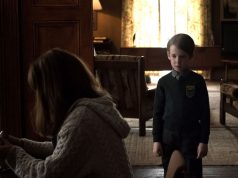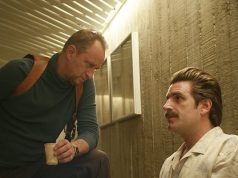In “Merry Christmas” (or “Joyeux Noel” as it’s known in its native France), German, Scottish and French soldiers lay down their arms in the middle of World War I to celebrate Christmas together. It’s a stunning act of pacifism and humanity, made all the more moving because it really happened, on a battlefield in France in 1914.
The film does the incident justice, and then writer/director Christian Carion adds needless embellishments and fictionalizations, I guess because even French movies need to be Hollywoodized. But the underlying story is still a poignant one.
We meet Nikolaus Sprink (Benno Furmann), an acclaimed German opera singer who is called up to military service when war is declared. His girlfriend, Danish soprano Anna Sorensen (Diane Kruger), is left behind. On the front, Sprink’s commanding officer, the efficient and calculating Lt. Horstmayer (Daniel Bruhl), thinks Sprink is soft and useless.
In Scotland, two brothers (Steven Robertson and Robin Laing) in a small village are thrilled to go to war, if only to leave their tiny town. Their village priest, Palmer (Gary Lewis), goes to the front with them as a chaplain.
And in the French section, fighting alongside the Scots, Lt. Audebert (Guillaume Canet) is in charge, literally sick to his stomach over the impossible task set before them. He must send his men out to fight the German in trenches not 200 feet away. He tells them they might be home for Christmas, unable to see how prolonged and devastating the war would prove to be.
On Christmas Eve, Anna pulls some strings to get permission for her beloved Sprink to perform a concert with her at a hotel in German-occupied France. From there, she further wrangles permission to accompany him back to the front, where there is more singing. This attracts the attention of the French and Scottish soldiers, who join in from the safety of their own trenches. Soon all three groups are in No Man’s Land, brokering a temporary truce and enjoying Christmas Eve together.
Well, it’s hard to call it quits after Christmas Eve, so the cease-fire spreads to Christmas Day, too. Men from all three countries play soccer, share chocolate, drink champagne, show off pictures of their wives, and practice speaking one another’s languages. It’s a genuinely heartwarming sequence, all schmaltzy and sappy and feel-good-y in an uncynical way.
In real life, the soldiers’ commanding officers were not happy to hear about the day-long tra-la-la-ing with the enemy, and eventually everyone had to be moved from the front and replaced with fresh soldiers who were more willing to kill one another. Those facts are addressed here, but just barely, almost in passing. It’s kind of a downer, after all, and what “Merry Christmas” wants is to make you feel happy. That it does, proficiently and sweetly.
B (1 hr., 56 min.; French and German with subtitles; )





